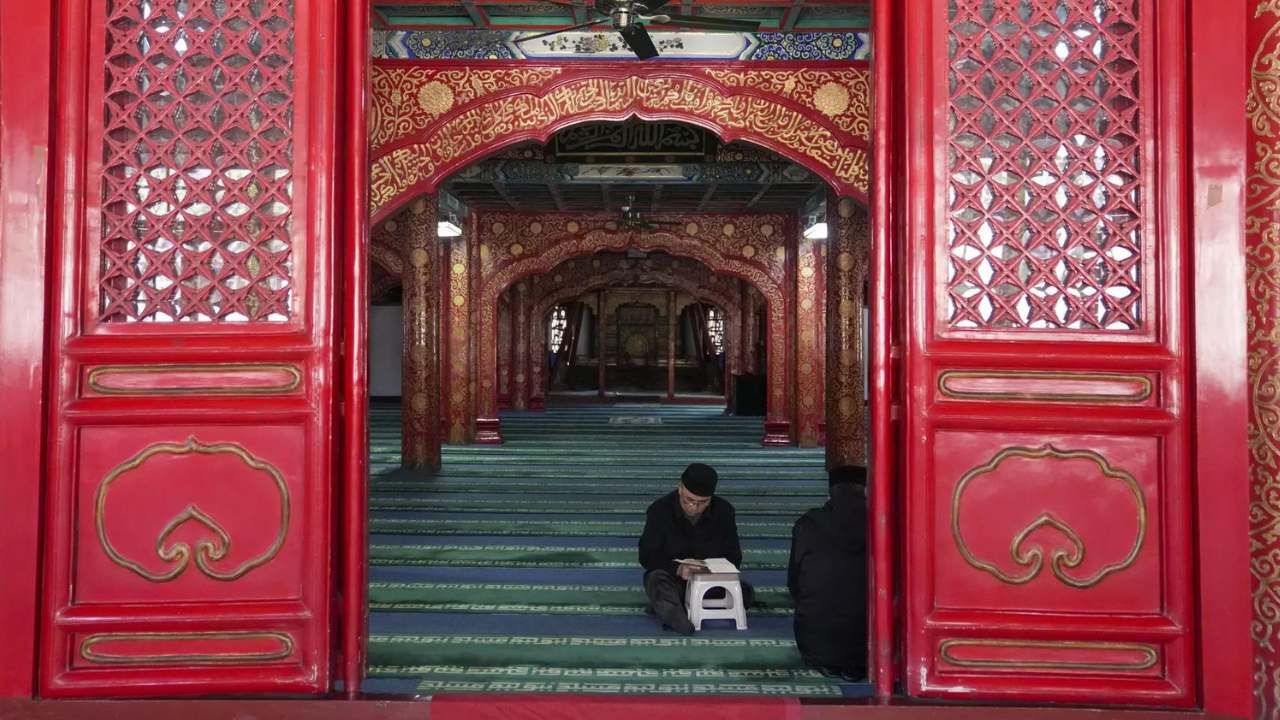
[ad_1]
NEW DELHI: The Chinese government’s crackdown on the Islamic faith, particularly among the Uyghur Muslim population in Xinjiang, has garnered significant international attention and condemnation due to human rights abuses and allegations of cultural genocide.
In a recent investigation, UK’s Sky News has shed light on China’s increasing control over Islamic practices within the country.The report underscores the mounting restrictions and surveillance faced by Muslims, particularly in regions with significant Islamic populations.
One poignant scene described in the report occurs in a cold, dusty part of central China, where a local Muslim leader stands alone in the courtyard of a small mosque. “Religion is dying,” he laments, highlighting the severe constraints imposed by the Chinese government on religious activities.
The report details how the Chinese authorities have intensified efforts to monitor and restrict Islamic practices, including demolishing mosques, banning religious attire, and censoring Islamic texts. This crackdown is part of a broader campaign to align religious practices with the state’s ideology and to curb any potential dissent.
The decline of religious freedom
The Chinese authorities have taken numerous steps to curb the practice of Islam:
Demolition of mosques: Many mosques have been demolished, particularly those that do not conform to the government’s architectural standards or those deemed too conspicuous.
Banning religious attire: Traditional Islamic attire, such as headscarves and long beards, has been banned in certain areas. This is part of an effort to assimilate Muslims into the broader Han Chinese culture.
Censoring Islamic texts: The government has also censored Islamic texts, removing any content that could be perceived as promoting extremism or dissent. This includes altering the Quran and other religious literature to fit the state’s narrative.
Surveillance and Repression
The report highlights the extensive surveillance network that monitors Muslim communities. High-tech surveillance systems, including facial recognition cameras, are prevalent in areas like Xinjiang, home to a significant Uyghur Muslim population. These systems track individuals’ movements and behaviors, ensuring strict compliance with the government’s regulations.
Impact on daily life
The restrictions have permeated all aspects of daily life for Muslims in China. Religious education for children has been heavily regulated, with many religious schools being shut down. Additionally, community leaders and imams are required to attend government-run re-education programs to ensure they propagate state-approved messages, the Sky News report said.
The international community has responded with concern over China’s treatment of its Muslim population. Human rights organizations have condemned the actions, calling for greater transparency and respect for religious freedoms. The Chinese government, however, maintains that these measures are necessary to combat extremism and ensure national security.
In a recent investigation, UK’s Sky News has shed light on China’s increasing control over Islamic practices within the country.The report underscores the mounting restrictions and surveillance faced by Muslims, particularly in regions with significant Islamic populations.
One poignant scene described in the report occurs in a cold, dusty part of central China, where a local Muslim leader stands alone in the courtyard of a small mosque. “Religion is dying,” he laments, highlighting the severe constraints imposed by the Chinese government on religious activities.
The report details how the Chinese authorities have intensified efforts to monitor and restrict Islamic practices, including demolishing mosques, banning religious attire, and censoring Islamic texts. This crackdown is part of a broader campaign to align religious practices with the state’s ideology and to curb any potential dissent.
The decline of religious freedom
The Chinese authorities have taken numerous steps to curb the practice of Islam:
Demolition of mosques: Many mosques have been demolished, particularly those that do not conform to the government’s architectural standards or those deemed too conspicuous.
Banning religious attire: Traditional Islamic attire, such as headscarves and long beards, has been banned in certain areas. This is part of an effort to assimilate Muslims into the broader Han Chinese culture.
Censoring Islamic texts: The government has also censored Islamic texts, removing any content that could be perceived as promoting extremism or dissent. This includes altering the Quran and other religious literature to fit the state’s narrative.
Surveillance and Repression
The report highlights the extensive surveillance network that monitors Muslim communities. High-tech surveillance systems, including facial recognition cameras, are prevalent in areas like Xinjiang, home to a significant Uyghur Muslim population. These systems track individuals’ movements and behaviors, ensuring strict compliance with the government’s regulations.
Impact on daily life
The restrictions have permeated all aspects of daily life for Muslims in China. Religious education for children has been heavily regulated, with many religious schools being shut down. Additionally, community leaders and imams are required to attend government-run re-education programs to ensure they propagate state-approved messages, the Sky News report said.
The international community has responded with concern over China’s treatment of its Muslim population. Human rights organizations have condemned the actions, calling for greater transparency and respect for religious freedoms. The Chinese government, however, maintains that these measures are necessary to combat extremism and ensure national security.


